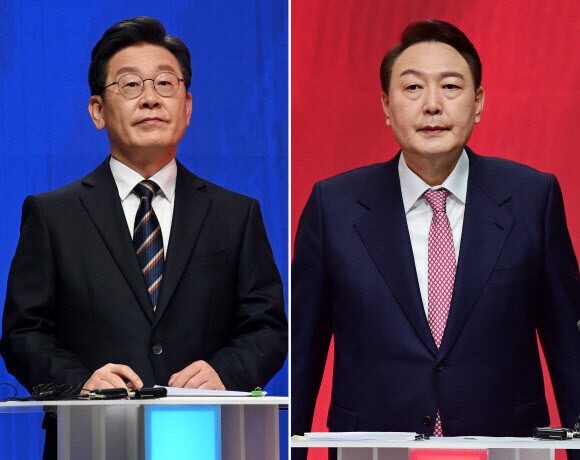hankyoreh
Links to other country sites 다른 나라 사이트 링크
[Column] What debate about Korean won becoming a key currency misses


By Lee Kang-kook, economics professor at Ritsumeikan University
The concept of a key international currency came up during a recent presidential debate on economics in South Korea. What started as an argument over what would be an appropriate debt-to-GDP ratio for Korea ended in controversy over the concept.
Responding to this question, Democratic Party candidate Lee Jae-myung noted that the International Monetary Fund had advised advanced economies to maintain a debt ratio of 85%.
In contrast, Yoon Suk-yeol, candidate for the People Power Party, said that countries without a key currency should keep their debt ratio low and would struggle if debt rose above 50%-60%. Lee responded by saying that the Korean won had a good chance of becoming a key currency, which prompted sharp criticism following the debate.
What about a key currency made Lee’s comment so controversial, and how is that related to the debt ratio?
In fact, key currency isn’t a strictly defined concept. In principle, the term refers to the US dollar, which is generally used in international settlements and financial transactions. But more broadly speaking, it can include the euro, the British pound and the Japanese yen.
Lee apparently made his remarks based on reports that the Korean won could be added to the IMF’s basket of currencies for Special Drawing Rights, or SDRs, but that’s separate from key currencies in the conventional sense.
But the question of whether the Korean won is a key currency bears little relation to what would be an appropriate debt-to-GDP ratio. Economic studies and international agencies put little stock in whether a country has a key currency when assessing its debt ratio.
In a report last year, the IMF based its forecast for the Korean government’s debt ratio on the 85% upper limit used for advanced economies.
When it comes to fiscal affairs, the crucial factor is monetary sovereignty. That’s what enables a central bank to issue currency and buy government bonds on the market in the event of a crisis. Greece, a member of the eurozone, faced a sovereign debt crisis because of its lack of monetary sovereignty.
It goes without saying that developing countries with a severe macroeconomic imbalance, little international credit standing, and a minor currency are likely to suffer chaos in the bond and forex markets when their debt soars relative to GDP — especially when foreign investors hold a large share of government bonds.
But since the Korean economy has solid fundamentals and a high sovereign credit rating, risk indicators for sovereign default are very low.
Considering that Korea’s sovereign debt in 2021 stood around 47% of GDP (according to the Ministry of Economy and Finance) and that the general government debt-to-GDP ratio, the international standard of comparison, was around 51% (according to the IMF’s Fiscal Monitor report), Korea’s debt was much lower than other advanced economies.
In terms of debt, Korea was in the middle of what might be called “non-key-currency countries.”
Crucially, 37% of Korean government bonds are financial debt with matching assets, a substantial amount of which is used to stabilize the forex market. Excluding those liabilities further lowers the debt ratio to 34% of GDP.
Setting aside the issue of key currency, what’s the upper limit for a sustainable debt-to-GDP ratio? Economists tend to stress that even that is not a fixed limit but varies with the economic growth rate, interest rate and growth forecast. The IMF has suggested a debt ratio of 85% for advanced economies based on leading indicators in past currency crises, but most advanced economies already have higher debt than that.
While research findings also vary, a 2015 study by the IMF and Moody’s Investors Service found that Korea’s maximum sustainable debt ratio was around 200 percentage points higher than its current level. Those researchers said that Korea had the best fiscal health of any country in the world.
More recently, some have argued that the ratio of interest payments on government bonds to GDP would be a better way of evaluating fiscal policy than the standard debt-to-GDP ratio.
The central tenet of fiscal policy today is the need to use fiscal expansion to overcome the hysteresis — or lingering scars — of a crisis and to keep the potential growth rate from falling. Expanding public investment to increase productivity and lift the birth rate can promote future growth, which is also fiscally useful.
For those reasons, conservative candidates need to rid themselves of the erroneous idea that the debt-to-GDP ratio should be kept low because the Korean won isn’t a key currency. Considering that Korea practiced much less fiscal spending than other countries during the COVID-19 pandemic, the controversy over key currencies must not become an obstacle to fiscal expansion.
Looking into the future, the real problem comes when the debt ratio keeps rising in the long term as budget deficits pile up. That could be Korea’s future in several decades if the government sticks to its current policy of medium welfare benefits with low personal contributions despite having the lowest birth rate and being the fastest aging society in the world.
While both the ruling and opposition presidential candidates say that around 300 trillion won of fiscal expenditure will be needed for welfare programs, there’s scant evidence in their platforms about how they would fund those programs.
If the candidates are actually thinking about fiscal health, they ought to broach the issue of raising taxes, but I suppose that talking about hiking taxes doesn’t help get votes in an election. It’s a shame that we’re getting so vexed over the issue of key currency without debating the future or our fiscal philosophy.
Please direct questions or comments to [english@hani.co.kr]

Editorial・opinion
![[Editorial] Perilous stakes of Trump’s rhetoric around US troop pullout from Korea [Editorial] Perilous stakes of Trump’s rhetoric around US troop pullout from Korea](https://flexible.img.hani.co.kr/flexible/normal/500/300/imgdb/original/2024/0509/221715238827911.jpg) [Editorial] Perilous stakes of Trump’s rhetoric around US troop pullout from Korea
[Editorial] Perilous stakes of Trump’s rhetoric around US troop pullout from Korea![[Guest essay] Preventing Korean Peninsula from becoming front line of new cold war [Guest essay] Preventing Korean Peninsula from becoming front line of new cold war](https://flexible.img.hani.co.kr/flexible/normal/500/300/imgdb/original/2024/0507/7217150679227807.jpg) [Guest essay] Preventing Korean Peninsula from becoming front line of new cold war
[Guest essay] Preventing Korean Peninsula from becoming front line of new cold war- [Column] The state is back — but is it in business?
- [Column] Life on our Trisolaris
- [Editorial] Penalties for airing allegations against Korea’s first lady endanger free press
- [Editorial] Yoon must halt procurement of SM-3 interceptor missiles
- [Guest essay] Maybe Korea’s rapid population decline is an opportunity, not a crisis
- [Column] Can Yoon steer diplomacy with Russia, China back on track?
- [Column] Season 2 of special prosecutor probe may be coming to Korea soon
- [Column] Park Geun-hye déjà vu in Yoon Suk-yeol
Most viewed articles
- 1Behind-the-times gender change regulations leave trans Koreans in the lurch
- 2Family that exposed military cover-up of loved one’s death reflect on Marine’s death
- 360% of young Koreans see no need to have kids after marriage
- 4Yoon’s revival of civil affairs senior secretary criticized as shield against judicial scrutiny
- 5‘Free Palestine!’: Anti-war protest wave comes to Korean campuses
- 6[Guest essay] Preventing Korean Peninsula from becoming front line of new cold war
- 7Korean president’s jailed mother-in-law approved for parole
- 8Japan says its directives were aimed at increasing Line’s security, not pushing Naver buyout
- 9[Editorial] Perilous stakes of Trump’s rhetoric around US troop pullout from Korea
- 10Nuclear South Korea? The hidden implication of hints at US troop withdrawal